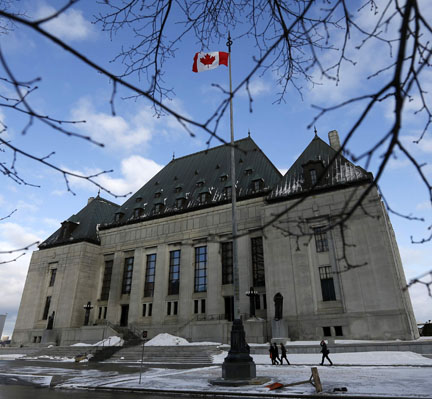This week, the Supreme Court of Canada will hear seven appeals, including the assisted suicide appeal of the late Kay Carter, and a couple of cases to determine the extent to which undercover operations may yield evidence.
 Oct. 14
Oct. 14 – Quebec –
Mouvement laïque québécois v. SaguenayHuman Rights: The city of Saguenay has a bylaw allowing those who wish to stand in prayer at the beginning of municipal hearings. There is also a crucifix and religious statue in the town hall. The applicant filed a complaint with the province’s human and youth rights tribunal, claiming religious discrimination and demanding that the prayers cease and religious symbols be removed. The tribunal allowed the application in part, but the appeal court set it aside, ruling that the city’s bylaw did not violate any duty to religious neutrality.
Read the Quebec Court of Appeal’s
decision.
Related news stories:
Supreme Court to hear the Saguenay city hall prayer case, CBC
Supreme Court agrees to hear appeal in Saguenay council prayers case,
Maclean’sOct. 15 – British Columbia –
Carter v. CanadaCharter of Rights: Kay Carter, now deceased, suffered from an intractable progressive disease. She joined with others in challenging provisions in the Criminal Code against assisted suicide and euthanasia. She succeeded at trial, notwithstanding the SCC’s decision in
Rodriguez, which found that relevant Criminal Code provisions do not breach Charter rights. An appeal court allowed the Attorney General of Canada’s appeal.
Read the British Columbia Court of Appeal’s
decision.
Related news stories:
B.C. women's case reopens Supreme Court's assisted-suicide debate,
The Globe and MailAssisted suicide appeal to be heard by Supreme Court, CBC
Oct. 16 – Ontario –
R. v. BouchardCriminal law: Bouchard was convicted of second-degree murder. He testified that he and the victim were heavily intoxicated, and the victim kissed him in a way that prompted him to relive traumatic memories of sexual abuse as a child. Bouchard threw the victim to the ground and stomped on him, causing the victim’s death. Bouchard argued that he should be convicted of manslaughter because he had been provoked and the Crown could not prove his intent to kill. At trial, the judge instructed the jury to adhere to a narrow definition of provocation. The SCC will review whether the appeal court erred in this respect.
Read the Ontario Court of Appeal’s
decision.
Related news story:
Man who killed gay friend given new trial,
MetroOct. 16 – Northwest Territories –
Lepine v. R.Criminal law: Lepine was convicted of sexual assault. At trial, he provided an alibi that was largely confirmed, but his entire criminal record had been put into evidence and the jury — post-evidence but before counsel’s final addresses — asked the judge whether a lack of credibility was sufficient to find guilt beyond a reasonable doubt. On appeal, Lepine argued that the trial judge failed to answer the jury’s question, but the court found that the judge’s actions were sufficient. The SCC will review whether the appeal court erred in law. A publication ban is in place.
Read the Northwest Territories Court of Appeal’s
decision.
Oct. 17 – Ontario –
R. v. ArayaCriminal law: The respondent was convicted of manslaughter after a mugging incident led to a shooting death in the park. The respondent, who said he had nothing to do with it, was not identified prior to trial. Rather, the jury relied on contradictory testimony from a teacher and photos taken of the respondent, which seemed to match general characteristics described by witnesses. The appeal court overturned the verdict, ruling that the trial judge failed to give the jury instructions on how to weigh the photographic evidence. The SCC will review whether the trial judge’s instructions were lacking.
Read the Ontario Court of Appeal’s
decision.
Oct. 17 – British Columbia –
Felger v. R. and
Healy v. R.Charter of Rights: The applicant, who owns a store in Abbotsford, went to some lengths to ensure that police did not enter the premises without a warrant. He posted a sign saying that police were not allowed entry and had his lawyer send a letter to the Chief of Police indicating that no member of the police department was allowed onto the premises. Nonetheless, undercover agents entered the store and purchased marijuana, after which Felger was charged. The trial judge found that the investigation violated Felger’s Charter rights. The appeal court, however, set aside the ruling and ordered a new trial. The applicant in the second case was an employee of Felger’s
Read the British Columbia Court of Appeal’s
decision.

 Oct. 14 – Quebec – Mouvement laïque québécois v. Saguenay
Oct. 14 – Quebec – Mouvement laïque québécois v. Saguenay